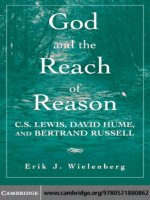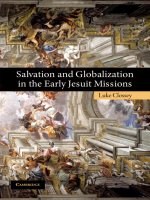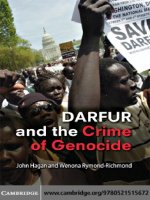0521828309 cambridge university press muslims and the state in britain france and germany oct 2004
Bạn đang xem bản rút gọn của tài liệu. Xem và tải ngay bản đầy đủ của tài liệu tại đây (1.01 MB, 226 trang )
P1: KcS
CY460/Fetzer-FM
CY460/Fetzer
0521828309
August 6, 2004
This page intentionally left blank
ii
18:3
P1: KcS
CY460/Fetzer-FM
CY460/Fetzer
0521828309
August 6, 2004
18:3
MUSLIMS AND THE STATE IN
BRITAIN, FRANCE, AND GERMANY
More than ten million Muslims live in Western Europe. Since the early 1990s
and especially after the terrorist attacks of September 11, 2001, vexing policy questions have emerged about the religious rights of native-born and immigrant Muslims. Britain has struggled over whether to give state funding
to private Islamic schools. France has been convulsed over Muslim teenagers
wearing the h. ij¯ab in public schools. Germany has debated whether to grant
“public-corporation” status to Muslims. And each state is searching for policies to ensure the successful incorporation of practicing Muslims into liberal
democratic society. This book analyzes state accommodation of Muslims’ religious practices in Britain, France, and Germany, first examining three major
theories: resource mobilization, political-opportunity structure, and ideology.
It then proposes an additional explanation, arguing that each nation’s approach
to Muslims follows from its historically based church–state institutions.
Professor Joel S. Fetzer teaches European and immigration politics at Pepperdine University. His research has been funded by the German Marshall
Foundation of the United States, the MacArthur Foundation, the Friedrich
Ebert Foundation, and the Yale Center for International and Area Studies. He
is the author of numerous articles and book chapters on comparative immigration politics and on religion and political behavior. His most recent book
is Public Attitudes toward Immigration in the United States, France, and Germany
(Cambridge University Press 2000).
J. Christopher Soper is Endowed Professor of Political Science and Chair of
the Social Science Division at Pepperdine University. A graduate of both Yale
Divinity School and Yale’s Ph.D. program in political science, Professor Soper
has written extensively on church–state relations and religion and politics in
Europe and the United States. Recipient of grants from the American Political Science Association and the Society for the Scientific Study of Religion,
he is author of Evangelical Christianity in the United States and Great Britain
(1994) and coauthor of The Challenge of Pluralism: Church and State in Five
Democracies (1997).
i
P1: KcS
CY460/Fetzer-FM
CY460/Fetzer
0521828309
ii
August 6, 2004
18:3
P1: KcS
CY460/Fetzer-FM
CY460/Fetzer
0521828309
August 6, 2004
18:3
Cambridge Studies in Social Theory, Religion, and Politics
Editors
David C. Leege University of Notre Dame
Kenneth D. Wald University of Florida, Gainesville
The most enduring and illuminating bodies of late nineteenth-century social
theory – by Karl Marx, Max Weber, Emile Durkheim, and others – emphasized the
integration of religion, polity, and economy through time and place. Once a staple
of classic social theory, however, religion gradually lost the interest of many social
scientists during the twentieth century. Scholarly interest in religiously based political conflict has reawakened with the recent emergence of phenomena such as
Solidarity in Poland; the dissolution of the Soviet empire; various South American,
Southern African, and South Asian liberation movements; the Christian Right in
the United States; and al Qaeda. At the same time, fundamental questions are once
again being asked about the role of religion in stable political regimes, public policies, and constitutional orders. The series Cambridge Studies in Social Theory,
Religion, and Politics will produce books that study religion and politics by drawing upon classic social theory and more recent social scientific research traditions.
Books in the series offer theoretically grounded, comparative, empirical studies that
raise “big” questions about a timely subject that has long engaged the best minds in
social science.
Other Books in the Series
Pippa Norris and Ronald Inglehart, Sacred and Secular: Religion and Politics Worldwide
iii
P1: KcS
CY460/Fetzer-FM
CY460/Fetzer
0521828309
iv
August 6, 2004
18:3
P1: KcS
CY460/Fetzer-FM
CY460/Fetzer
0521828309
August 6, 2004
18:3
Muslims and the State
in Britain, France,
and Germany
Joel S. Fetzer
Pepperdine University
J. Christopher Soper
Pepperdine University
v
Cambridge, New York, Melbourne, Madrid, Cape Town, Singapore, São Paulo
Cambridge University Press
The Edinburgh Building, Cambridge , UK
Published in the United States of America by Cambridge University Press, New York
www.cambridge.org
Information on this title: www.cambridge.org/9780521828307
© Joel S. Fetzer and Christopher Soper 2005
This publication is in copyright. Subject to statutory exception and to the provision of
relevant collective licensing agreements, no reproduction of any part may take place
without the written permission of Cambridge University Press.
First published in print format 2004
-
-
---- eBook (NetLibrary)
--- eBook (NetLibrary)
-
-
---- hardback
--- hardback
-
-
---- paperback
--- paperback
Cambridge University Press has no responsibility for the persistence or accuracy of s
for external or third-party internet websites referred to in this publication, and does not
guarantee that any content on such websites is, or will remain, accurate or appropriate.
P1: KcS
CY460/Fetzer-FM
CY460/Fetzer
0521828309
August 6, 2004
18:3
Dedicated to Christina
,
,
and Ansar Fayyazuddin, dear friend and ally in the quest
for justice
– JSF
Dedicated to my wife, Jane Woodwell, and children, Katharine
and David
– JCS
vii
P1: KcS
CY460/Fetzer-FM
CY460/Fetzer
0521828309
viii
August 6, 2004
18:3
P1: KcS
CY460/Fetzer-FM
CY460/Fetzer
0521828309
August 6, 2004
18:3
Contents
List of Figure and Tables
Preface
1 Explaining the Accommodation of Muslim Religious
Practices in Western Europe
2 Britain: Establishment Religion and Islamic Schools
3 France: La¨ıcit´e and the H
¯
. ijab
page x
xi
1
25
62
4 Germany: Multiple Establishment and Public
Corporation Status
5 Public Attitudes toward State Accommodation
of Muslims’ Religious Practices
6 Integration and Muslim Practice
130
146
Appendix: Survey Characteristics
Glossary of Non-English Terms
159
165
Bibliography
Index
169
199
98
ix
P1: KcS
CY460/Fetzer-FM
CY460/Fetzer
0521828309
August 6, 2004
18:3
List of Figure and Tables
Figure
5.1
Public support for Islam in the schools in Britain, France,
and Germany
page 133
Tables
5.1
5.2
5.3
5.4
6.1
x
Religious Identification in Britain, France, and Germany
(in percentages)
Determinants of Support for Islam in the Schools in Britain,
France, and Germany
Determinants of Support for Muslim Religious Practices
in Britain, France, and Germany
Support for Islam in the Schools before and after September 11
Summary of Theoretical Findings
134
136
137
144
147
P1: KcS
CY460/Fetzer-FM
CY460/Fetzer
0521828309
August 6, 2004
18:3
Preface
This book began while we were working on separate projects in European
immigration politics and church–state relations. Throughout this previous research, we continued to encounter the somewhat anomalous phenomenon of religiously practicing Muslims settling in largely secular
Western Europe. Much of the xenophobic rhetoric of extreme right-wing
parties in the region also seemed increasingly anti-Islamic rather than simply anti-immigrant. The way in which states responded to the religious
needs of Muslims, moreover, seemed linked to the particular church–state
institutions of that country. Ted Jelen of the University of Nevada provided
the first impetus to present our ideas on this topic at an American Political Science Association panel in 1999. After publishing this paper, we then
decided to pursue a book-length study of the issue.
In the interest of full disclosure, we should probably document our own
religious commitments, which were the subject of much curiosity during
our field work. The first author is an active Mennonite with likely Jewish
ancestors. The second author is an ordained minister in the United
Churches of Christ, currently belongs to an Episcopal congregation, and
holds fairly orthodox Christian beliefs. At any rate, both writers are strongly
committed to religious liberty for all, not just for those believers whose faith
is shared by a national majority or is popular.
xi
P1: KcS
CY460/Fetzer-FM
xii
CY460/Fetzer
0521828309
August 6, 2004
18:3
PREFACE
As coauthors, we each have our individual specializations and so divided
the work on this book accordingly. Fetzer focuses on quantitative studies of
immigration politics in France and Germany, while Soper concentrates
on institutional, church–state analysis of Britain and Germany. During
the actual drafting of the text, Soper was primarily responsible for the
British chapter, Fetzer for the French one, and the remaining narrative was
written jointly.
The extensive field work needed for this project would never have been
possible without substantial financial help from several sources. Pepperdine University provided release time for writing and financial support
for travel, data collection, and translation of German-language interviews
via the Dean’s Summer Research Fund and the Endowed Fellowship and
Endowed Professorship programs. We particularly wish to thank Dean
David Baird and Assistant Dean Lee Kats for generously supporting faculty
scholarship at Pepperdine. Central Michigan University funded a summer
of Arabic study and preliminary writing. The German Marshall Fund of
the United States made possible seven months of field work in the three
countries. Grants from the American Political Science Association and the
Society for the Scientific Study of Religion helped pay for the addition of
several questions to two waves of Roper Europe’s crossnational surveys.
Responsibility for the analysis and interpretations in this book, however,
rests solely with the authors.
Several institutes provided office space, research support, and collegiality
¨ Migrationsforschung
during our stays abroad. Klaus J. Bade’s Institut fur
¨ hosted
und Interkulturelle Studien (IMIS) at the Universit¨at Osnabruck
Fetzer during the winter semester of 2001. Catherine Wihtol de Wenden
´
similarly accommodated the first author at Sciences Po’s Centre d’Etudes
et de Recherches Internationales (CERI) in Paris. North of the English
Channel, Pepperdine University’s London Center housed both authors
in the spring and summer of 2001. Finally, the Institut de Recherches et
´
d’Etudes
sur le Monde Arabe et Musulman (IREMAM) of the Universit´e
de Provence was the first writer’s semi-official home during his month of
interviewing in Aix-en-Provence and Marseille.
A number of data archivists and survey researchers greatly aided
¨ Empirische Sozialthis project. Horst Weinen of the Zentralarchiv fur
¨ generously provided us many helpforschung at the Universit¨at zu Koln
ful German citations and relevant data sources. Danielle Hermitan of the
´
Banque de Donn´ees Socio-Politiques at the Institut d’Etudes
Politiques de
Grenoble likewise furnished us with the equivalent French data. London’s
Market and Opinion Research International (MORI) allowed us to
P1: KcS
CY460/Fetzer-FM
PREFACE
CY460/Fetzer
0521828309
August 6, 2004
18:3
xiii
analyze its 2001 poll on faith-based schools. Finally, Dagmar Morton and
Alex Lund of Roper ASW in London conducted two waves of a threenation poll on Islam in Europe for us. As usual, neither the producers nor
providers of these data are responsible for our analyses and interpretations in
this book.
We would also like to thank the many European and American
scholars and activists who counseled us on their particular specialities:
Mohammed Salim Abdullah, Klaus J. Bade, Laurie Brand, Jocelyne
Cesari, Franck Fregosi, Vincent Geisser, Thomas Lemmen, R´emy Leveau,
Francis Messner, Fuad Nahdi, Simone Nasse, Jørgen Nielsen, Jean-Claude
Santucci, Ataullah Siddiqui, and Catherine Wihtol de Wenden. Thanks also
to David Leege, Jørgen Nielsen, Kenneth Wald, and Catherine Wihtol de
Wenden for their careful and gracious comments on all or part of our
manuscript. We are similarly grateful to Klaus J. Bade, David R. Cameron,
Rogers M. Smith, and Ted G. Jelen for writing letters in support of our
German Marshall Fund application. All previously mentioned individuals are nonetheless relieved of any responsibility for our errors of fact
or judgment.
Others provided more technical assistance. Paul Heere helped transcribe our German-language interviews. Mahmoud El-Sakkary translated
some relevant works from Arabic. Mal´ıa Rivera patiently faxed countless letters all over Europe for us. And Tammy Ditmore composed our
extensive index.
This book owes its existence to the approximately one hundred interviewees in Europe who graciously gave of their time to help two inquiring Americans even though our informants had no reason to trust us or
our motives. Often our hosts also served us delicious South Asian, North
African, or Turkish meals, fringe benefits of our jobs in comparative political science. Though we are equally grateful to them, a number of the
people we interviewed do not appear in the bibliography for various reasons. Some preferred to remain anonymous, others provided information
confirming the accounts of cited interviewees, and others did not grant us
formal permission to use their interviews in this book. To all a sincere thank
you, merci, or Danke. Sadly, international understanding has deteriorated
to such an extent since September 11, 2001, that we probably would not
be able to conduct such interviews now. We should also note that unless
otherwise indicated, the affiliations and positions of interviewees as listed in
the bibliography are current as of the first half of 2001. Since we ended our
field work, some of our informants have switched titles or organizations in
the rapidly changing world of European Muslims.
P1: KcS
CY460/Fetzer-FM
xiv
CY460/Fetzer
0521828309
August 6, 2004
18:3
PREFACE
Lewis Bateman of Cambridge University Press deserves special gratitude for guiding us through the production process and approving this
manuscript in the first place. We are also thankful to his assistant,
Lauren Levin, for helping out with various publication-related details, to
Cambridge University Press’s two anonymous reviewers for very useful
suggestions for revision, and to Andy Saff for exemplary copy-editing.
Portions of this book have appeared elsewhere previously and are used
with permission. A previous version of Chapter 1 formed the basis for
the article “Explaining the Accommodation of Muslim Religious Practices
in France, Britain, and Germany” in French Politics ( C 2003 by Palgrave
Macmillan Ltd.). Most of Chapter 5 likewise appeared as “The Roots of
Public Attitudes toward State Accommodation of European Muslims’ Religious Practices before and after September 11” in the Journal for the Scientific
Study of Religion ( C 2003 by JSSR).
Over the seven years of work on this book, both authors have enjoyed
immense support from their families and close friends. Joel is especially
grateful to Christina Chiung-Hua Wu, who entered his life almost immediately upon his return to the United States. Her love, toleration, and
confidence in him make their life together a joy. Fetzer similarly wishes
to thank Ansar Fayyazuddin of Stockholms universitet for two decades of
warm friendship, intellectual exchange, interreligious dialogue, and political solidarity as well as for serving as best man when Joel and Christina
married. Fetzer’s ever-adventurous parents once again found time in their
busy schedules to keep him company during arduous stretches of field
work on the French Riviera. Isaak I-li Fetzer, who was born six hours
after Joel completed the penultimate draft of this book, has tolerated
his daddy’s occasional bouts of proofreading-induced absent-mindedness.
¨ hosted Joel during the winter of 2001.
The Baptiste Gemeinde Osnabruck
´
And Oscar
A. Ch´avez, Eliseo Franco, Daniel Gonz´alez, and the rest of
Iglesia Evang´elica Bethel have prayed for and nurtured Fetzer since the
mid-1990s.
Chris would like to thank Jane Woodwell, his wife and his best friend.
With good humor, grace, and patience, Jane has supported his efforts while
forging a career of her own. Chris would also like to thank his children,
Katharine and David, who patiently endured their father’s extended absences for research trips to Western Europe and sometimes long hours
at the office. It is always a joy to return home to such an understanding
and energetic family, and to consider with them the substance of daily living, including play schedules, sports matches, youth outings, homework
P1: KcS
CY460/Fetzer-FM
PREFACE
CY460/Fetzer
0521828309
August 6, 2004
18:3
xv
assignments, and chores. Soper’s parents, Ralph and Rosemary, instilled in
him a love of learning and an intellectual curiosity without which such a
project could never have been imagined. Finally, Chris wishes to thank his
“third floor” friends Mike, Steve, Jeff, and Greg, who have provided grist
for his intellectual and spiritual mill for more than a decade.
P1: KcS
CY460/Fetzer-FM
CY460/Fetzer
0521828309
xvi
August 6, 2004
18:3
P1: JRT/KMN
0521828309c01
P2: JRT
CY460/Fetzer
0521828309
July 30, 2004
10:34
1
Explaining the Accommodation
of Muslim Religious Practices
in Western Europe
The government has been telling us that we are citizens of this country, that we
have equal rights. But when we ask for equal rights, for our own schools like other
faiths have their own schools, the government tells us that they will be divisive,
and that they will create a ghetto mentality. It is Islam that has been ghettoized by
the Establishment.
K. S. Butt (2001), chair of the Islamic Resource Centre, Birmingham
Muslims have become a part of this society. More than three million Muslims live
in Germany permanently. They are not going to “go home.” Their home is here.
Nadeem Elyas (2001), chair of the Zentralrat der Muslime in
Deutschland, Cologne, Germany
Today, a French person is not necessarily Catholic, Protestant, etc. Otherwise, a
French person would have a beret, a baguette – those are stereotypes. Today a person
is French through an act of citizenship, by sharing certain common values and by
[supporting] everyone’s right to find happiness. . . . But in the end a French person
can be a Muslim, can be a Catholic, can be a Jew, can be a Buddhist. . . . [Muslims
should enjoy religious liberty] just as other [French] citizens do.
Sa¨ıda Kada (2001), president of Femmes Franc¸aises et Musulmanes
Engag´ees, Lyon, France
state accommodation of Muslim religious practices is an increasingly
important political issue across Western Europe. More than ten million
Muslims currently live in Western Europe, which makes them the largest
1
P1: JRT/KMN
0521828309c01
P2: JRT
CY460/Fetzer
2
0521828309
July 30, 2004
10:34
MUSLIMS AND THE STATE
religious minority in the region. Islam is the third largest religion overall,
and in most West European countries, it is growing much faster than the
historically dominant Catholic and Protestant churches (Hollifield 1992;
Nanji 1996; Nielsen 1999). In Germany, there are an estimated 2,200
mosques or Islamic prayer rooms, most of which have been organized in
the past decade but which are still insufficient to meet the religious needs
of Muslims in the country (Kusbah 1997; Spuler-Stegemann 1998:150).
There are nearly as many religiously active Muslims as Anglicans in England
and Roman Catholics in France (Brierley 2001; Caldwell 2000). Islam is a
significant social and religious force in Western Europe.
The quotations at the beginning of this chapter suggest that Muslims
want the state to recognize their religious status and accommodate them
justly and fairly. As we will demonstrate in the pages ahead, however, what
states view as equitable treatment for Muslim citizens and immigrants, what
they consider to be reasonable and just in terms of accommodating Muslim
religious practices, and how governments pursue the twin policies of recognizing the religious rights of Muslims while insuring their effective incorporation into the values of the host country vary widely in Western
Europe. Although states face similar challenges, there is a notable crossnational divergence in policy related to how and whether Western European
states recognize and accommodate Muslim religious practices. The aim of
this book is to explain how three European states – Britain, France, and
Germany – have accommodated the religious needs of Muslims, and to
explain why there is such a difference in how they have done so.
Background
Muslims began immigrating to Europe in large numbers following the
Second World War. They were part of a great wave of immigration that
brought workers from the poorer countries of the Mediterranean, Eastern
Europe, and the former colonies to the industrialized states of the West
that were enjoying an economic boom and trying to rebuild in the war’s
aftermath. Private employers and governments across Western Europe actively recruited foreign workers to provide the labor necessary to continue
the economic expansion (Bade 1983:59–95; Fr´emeaux 1991:209–75).
In the face of the economic recession of the early 1970s, however,
European states gradually closed their borders to low-skilled workers but
allowed for the possibility of family reunion and political asylum. Host
countries assumed that immigrants were temporary workers who would
P1: JRT/KMN
0521828309c01
P2: JRT
CY460/Fetzer
0521828309
July 30, 2004
ACCOMMODATION OF RELIGIOUS PRACTICES
10:34
3
want to return to their country of origin, but many foreign-born residents had no interest in doing so. Ironically, this effort to restrict immigration had the unintended consequence of encouraging a “second wave”
of immigration as family members and dependents of the original postwar
economic migrants joined their families in Western Europe. This policy
transformed the immigrant population from single migrants to families who
wanted permanent settlement (Boyer 1998:87–104; Kettani 1996; Nielsen
1999:25–35). Since many of these immigrants were Muslims, the Muslim
population in Western Europe expanded rapidly.
Family settlement also changed the political calculus; immigrants became concerned not simply with their political and economic rights as
workers, but also with their cultural and religious needs as permanent residents or citizens. Vexing policy questions emerged related to the religious
rights of Muslim immigrants and citizens. Governments were suddenly
confronted with such issues as how or whether to accommodate Muslim
religious practices in state institutions such as schools, prisons, and hospitals; how or whether to develop their communities; whether to pass laws
specifically designed to protect Muslims against religious discrimination;
and what efforts to take to stem native discrimination against them (Cesari
¨
1997; Morsy 1992; Nielsen 1999:36–46; Ozdemir
1999:244–59).
The result in every country in the region has been political controversy
around issues of Muslim religious rights. Conflict in Britain has crystallized
on the question of whether the state education system will fully finance private Islamic schools under the same conditions that apply to Christian and
Jewish ones. Germany has contended with the question of how or whether
to grant public corporation status (K¨orperschaft des o¨ ffentlichen Rechts) to
Muslims as well as to Christians and Jews. Such a status would signal that
Islam is a part of the country’s religious landscape and allow Muslims’ social
welfare organizations to receive state funds. France annually struggles with
the question of whether or not Islamic girls will be allowed to wear the h.ij¯ab
in public schools. Each of the states has witnessed negotiations over such
contested practices as regulations on building mosques and policy regarding
the religious needs of Islamic workers. Finally, there is a vibrant debate in
each of these countries on what the goals of public policy toward Muslims
ought to be. On the one hand, governments sometimes pursue policies
that encourage Muslims to assimilate themselves to the values of Western
society, even when that means abandoning some of the particular features
of their religious identity. At other times, states have encouraged Muslims
and others to celebrate religious diversity and for Muslims to maintain their
most deeply held religious values.
P1: JRT/KMN
0521828309c01
4
P2: JRT
CY460/Fetzer
0521828309
July 30, 2004
10:34
MUSLIMS AND THE STATE
These concerns became more acute in the aftermath of the attacks on
the World Trade Center in September 2001 by Muslim extremists. The
realization that many of the terrorists in those attacks had lived and trained
among a network of coreligionists in Western Europe raised significant
questions among political leaders on how best to ensure the successful incorporation of Muslims into the values of a liberal democracy. Jean-Marie
Le Pen of National Front scored a surprising electoral victory in France’s
presidential primary election of 2002, and the British National Party won
its first two victories in over a decade in city council races that same year. In
both cases, these far-right parties ran on anti-immigrant and anti-Muslim
political planks. Governments throughout the region passed more restrictive immigration and asylum laws. Those policies are particularly salient
to Muslims, who make up the largest percentage of immigrants and asylum seekers to Western European countries. What is clear is that disputes about the Islamic religion and Muslims are increasingly prominent in
Western Europe.
While European states have faced a common set of challenges in accommodating the religious needs of Muslims, they have taken substantially
different approaches in their accommodation of Muslims’ religious practices. Britain1 led the way in tightening immigration controls in the early
1960s and limiting the citizenship opportunities for residents in its former
colonies. In more recent years, Britain has refused to extend the law against
racial discrimination in employment, housing, and education to include religious discrimination, a key concern for Muslims (Islamic Human Rights
Commission 2000), and the Blair Labour government has proposed a bill
that would make it more difficult for immigrants and asylum seekers to gain
citizenship (Hoge 2002).
At the same time, however, the state has been fairly open to accommodating the cultural and religious needs of Muslims (Spencer 1997). Britain
embraced multiculturalism in state-supported schools in the 1970s; the curriculum in required religious-education classes includes an extensive treatment of not only Christianity, but also Judaism, Islam, and Sikhism (Keene
and Keene 1997). When confronted with the issue of girls wearing the h.ij¯ab
in state-run schools, British educational authorities quickly reached a compromise that allowed girls to wear the headcovering so long as it conformed
with the color requirements of the school uniform (Liederman 2000). After
1
This book will consider policy regarding state accommodation of Muslims’ religious practices in England, as opposed to the policy in all four regions (England, Northern Ireland,
Scotland, and Wales) that make up the United Kingdom.
P1: JRT/KMN
0521828309c01
P2: JRT
CY460/Fetzer
0521828309
July 30, 2004
ACCOMMODATION OF RELIGIOUS PRACTICES
10:34
5
many years of trying to win state aid for Islamic schools under the same
conditions that govern aid to Christian schools within the state system,
the government in 1998 approved two independent Islamic schools (Howe
1998). A recent Green Paper on education encouraged an expansion of the
faith-based school system to allow many more religious schools to receive
state aid (Schools 2001).
France began to place greater restrictions on immigration in the 1970s;
in the early 1980s, the state initiated what turned out to be a wholly ineffectual policy of subsidizing migrants’ return to their country of origin (Weil
1991). Most of these laws were repealed in the late 1990s. The legislature
also passed laws that made it marginally more difficult for immigrants and
the children of immigrants to gain citizenship, although most Muslims in
France are citizens.
In contrast to Britain, however, France has been far less accommodating to the religious needs of Muslims. France has rejected multiculturalism
as an appropriate educational model in the state schools. Aside from such
short lessons on the “Muslim world” as those in the cinqui`eme history and
geography class (Marseille and Scheibling 1997:24–39), French secondary
school students learn nothing about Islam. Despite the popular impression
´
that the Conseil d’Etat’s
decision on the “Scarf Affair” resolved the issue
(Cesari 1997:108–21; de Wenden and Leveau 2001:78–9; Gaspard and
Khosrokhavar 1995), French Muslim leaders estimate that “hundreds” of
Muslim young women have been expelled from public schools for refusing
to remove the h.ij¯ab (Kabtane 2001; Merroun 2001). These young women
are then forced to study by correspondence, rely on volunteer Muslim
tutors, or abandon their education altogether (Kada 2001). This strict version of la¨ıcit´e is the dominant view in the most powerful teacher unions
(Berguin 2001), which is significant because teachers are public officials
who implement policy in the institution where church–state conflict around
Islam most consistently arises: the schools. The state has been vigorously
secular and opposed to the notion that public institutions should be made
to assist the religious practices of Muslims (Peach and Glebe 1995).
A third country, Germany, represents something of a hybrid of these state
responses. Only a very small percentage of Muslims in Germany are citizens,
¨
and until President Gerhard Schroder’s
reforms of 1999, very few immigrants had the right to become German nationals. The state has also used
various measures to encourage immigrants to return home, though these
have largely been ineffectual. Finally, the German government has urged
states in the European Union to tighten domestic immigration controls
( John 2002).
P1: JRT/KMN
0521828309c01
P2: JRT
CY460/Fetzer
6
0521828309
July 30, 2004
10:34
MUSLIMS AND THE STATE
On the other hand, Germany has been more willing than France to
accommodate the cultural and religious needs of its Muslim population.
The state has funded some Islamic social welfare and cultural organizations
and established an Islamic school in Berlin (Doomernik 1995). In the state of
North Rhine-Westphalia, moreover, education authorities have mandated
the teaching of Islam in required religion courses in public schools, and
have even gone so far as to write the required textbook. The clear intent
of this decision is to encourage Muslims to learn more about their faith in
the public schools, and to ensure that the version of Islam they are taught is
fully compatible with liberal democracy (Gebauer 1986, 2001; Pfaff 2001).
There have been a number of fine studies of immigration into Western
Europe (Castles and Miller 1993; Collinson 1993; Joppke 1999; Soysal
1994). These scholars have focused much needed attention on a phenomenon that has, in the words of one analyst, “been more transformative in [its] effect” in Western Europe than any other since 1945 (Messina
1996:134). These accounts, however, tend to focus on economic and citizenship issues and largely ignore questions of the religious identity and
needs of Muslims. Social scientists, in short, have devoted very little attention to the religious aspect of Muslim policy demands, despite the fact that
social and political tensions have mounted in recent years over a series of
religious matters.
One reason for this silence on religious questions has been a perception
among social scientists, often assumed rather than stated, that Western
Europe is essentially secular and that issues of church and state are no
longer relevant to public policy. According to this view, religious disputes
were historically important in Europe, but those issues were largely settled, or at least minimized, in recent decades as the state became more
secular and began to treat religious groups more or less equally. As we will
demonstrate in the country chapters that follow, there is something to this
thesis. Religion, which was at the center of political conflict in Europe a
century ago, became less important politically in the middle decades of the
twentieth century. However, the migration and settlement of large numbers of Muslims into Western Europe poses a new challenge to the existing
church–state arrangements in countries and has resurrected somewhat dormant religious disputes.
Theories To Be Tested
How can we explain the disparate political responses to the religious concerns of Muslims in Britain, France, and Germany? What have these states
P1: JRT/KMN
0521828309c01
P2: JRT
CY460/Fetzer
0521828309
July 30, 2004
ACCOMMODATION OF RELIGIOUS PRACTICES
10:34
7
done in terms of public policy to accommodate the religious needs of their
Muslim populations, and just as importantly, what explains the different
state reactions? There is very little literature and no consensus on this central question, but there is a very rich literature on the policy-making process as it relates to immigration and citizenship policies in Western Europe
that can be applied to our primary concern. The dominant theories in the
field are resource mobilization that views politics as a contest of competing actors, with the outcome affected by their relative resources. Political
opportunity structure theory analyzes how political institutions shape the
way that actors advance their interests and the ensuing policies. Ideological theories contend that preexisting ideas about the nature and purpose
of government impact the development of public policy. We argue in this
book that each of these theories sheds some light on state accommodation
of Muslim religious rights in Britain, France, and Germany, but that none of
them sufficiently explains important differences among the countries. We
contend that the development of public policy on Muslim religious rights
is mediated in significant ways by the different institutional church–state
patterns within each of these countries.
Resources and Muslim Mobilization
One common approach in the literature on immigration is to focus on the
origin, ethnic composition, and organizational patterns of Muslim communities within a particular nation-state (Anwar 1995; Bistolfi and Zabbal
1995; Kepel 1997; Nielsen 1995; Penninx et al. 1993). These accounts explain a state’s policy on Muslim religious rights by analyzing domestic political considerations and the relative power of parties and movements that
support Muslim religious rights against those that oppose them. Borrowing
implicitly from resource mobilization theory, these descriptions accent the
role of resources in mobilizing Muslim groups in Western Europe and stress
the organizational structures that link individuals into a social movement.
Resource mobilization theory emerged in the late 1970s as a deliberate attempt to correct the psychological models of collective behavior that
dominated sociology and political science in the 1960s (Gamson 1990; Zald
and McCarthy 1987). This theory rejected the assumptions of the prevailing explanations that held that collective action was a spontaneous and
disorganized activity and that movement participants were essentially irrational. By contrast, resource mobilization theory assumed the rationality
of participants in a social movement and focused on the capacity of organized groups to acquire politically significant resources for their collective
purposes (Ferree 1992).









